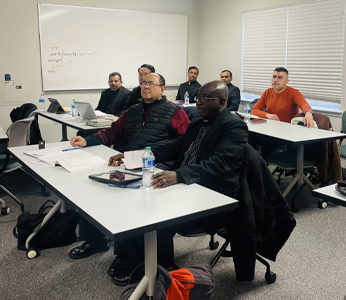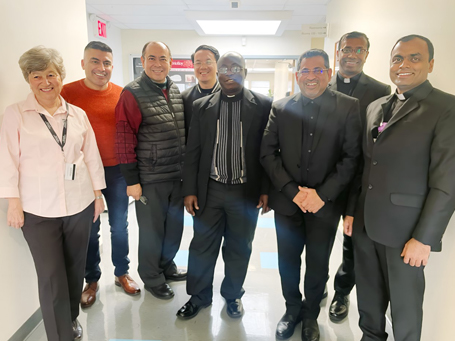March 30, 2023
Lessons in Pronunciation Help International Priests Reach American Parishioners
 Father Hilary Nwajagu, a native of Nigeria now serving as an associate pastor of St. Joseph’s parish in Garden City, has noticed parishioners there are better able to understand his homilies in recent months. They frequently approach him after Mass to discuss his main points.
Father Hilary Nwajagu, a native of Nigeria now serving as an associate pastor of St. Joseph’s parish in Garden City, has noticed parishioners there are better able to understand his homilies in recent months. They frequently approach him after Mass to discuss his main points.
Young people at the children’s Masses he celebrates also seem more engaged, and the priest says that he can now process what they are saying back to him as well.
“The essence of communication is to be understood,” says Father Nwajagu, who has served at St. Joseph’s for almost two years.
A big reason for the improved understanding between Father Nwajagu and his parishioners is his enrollment in the Effective Communication for International Priests course he took in the Fall 2022 semester at Molloy University.
The 11-week course, offered for free thanks to a generous benefactor, is taught by Sister Alexandria Wolochuk, O.P., an associate professor in Molloy University’s School of Education and Human Services.
Sister Alex, as she is known, is a 32-year classroom veteran at Molloy. A member of the Sisters of St. Dominic of Amityville, the religious congregation that founded the University, her primary focus is guiding graduate students in teacher training in the TESOL (Teaching English to Speakers of Other Languages) program. The university recognized her with a Lifetime Achievement Award in 2019.
Since that year, she has also led the Effective Communication course each semester. The class meets on Thursdays, with the priests invited to arrive half an hour early to share lunch and socialize with each other before the two-hour class begins at 1 p.m.
This semester’s enrollment is eight priests, the maximum for a course featuring individual attention and instruction. Most of the priests have served in the United States for a year or two.
The Diocese of Rockville Centre plays a key role in promoting the course among the priests who serve on Long Island. “It’s a very important step,” Sister Alex said.
The benefactor, Robert Coughlan, is a Long Island real estate developer who takes care of all costs associated with the course including tuition, books and materials, as well as lunch.
He first heard about Sister Alex when she was teaching another version of the course in the Diocese of Brooklyn that was featured in The Tablet newspaper. He told her that the article made it seem like she was the person he was seeking to help remedy the common problem he faced of not being able to understand priests from other countries now serving in U.S. parishes.
When Coughlan asked Sister Alex about starting the course at Molloy, she politely declined at first. His persistence, driven by his faith and generosity, eventually paid off.
Sister Alex said she tells the priests about Coughlan and his wife, AnnMarie, in the first class of a new semester so they understand how the course is made possible.
She also lets the priests know their attendance at every class session is of prime importance. The priests are asked to set a goal for themselves, using what they see as their weaknesses as a marker. In many cases, they are passing along feedback from their new parishioners, she said.
Sister Alex candidly tells her students that they will retain their accent at the end of the semester, a fact that surprises some. She also notes that the priests of a particular country may have a specific difficulty as they speak English. “So, we practice those,” she said.
Her priest-students generally do not have any problems in understanding or speaking English. “They need help with pronunciation,” said Sister Alex, who notes that those who
learning English are taught the rules of grammar, while the elements of pronunciation are often glossed over.
Sister Alex teaches using a variety of tools and approaches. The priests can learn by watching her or the videos she screens showing proper pronunciation by emphasizing vowel stress and intonation. She also focuses on demonstrating stresses on certain syllables or words in a sentence.
Her methods range from TED talks to lyrics from Simon and Garfunkel lyrics from the 1960s and 1970s to give context to the American culture the priests are now experiencing first-hand.
All the lessons serve the common goal the priests bring to the course. “They want to be better understood by their parishioners,” Sister Alex said. That goal is made more important by their preaching in front of a congregation each Sunday, she said.
Father Nwajagu’s classmates last fall were two other priests, one from Nigeria and the other from Ghana. They were able to draw upon their African cultural background in class.
“It offered us the opportunity of listening to one another, hearing the stories of one another and bringing our stories to the class to discuss with Sister Alex,” he said in a phone interview.
His perspective about the course shifted from the outset when he thought he would begin to speak like an American. Through Sister Alex’s lessons, Father Nwajagu was able to improve his pronunciation and stress the correct syllables. That in turn helped him to relax and develop a love of English. “Every language has its own melody,” he said.
One practical lesson Father Nwajagu cited as extremely beneficial was when Sister Alex asked the priests to record their Sunday homilies and send them to her, so she could listen before the next class. “It helped us to listen to ourselves and understand the mistakes we’re making,” he said. The priest continued to practice after class as well, and the recording has become a regular part of his routine.
Father Jacob Varughese, O.I.C., an associate pastor of St. Ignatius Loyola parish in Hicksville for the past year, who is enrolled this semester, said he appreciates Sister Alex’s friendly, personal approach and eagerly attends each class.
He said he is grateful for her corrections, such as a suggestion that he reduce the speed of his speech, which he feels is helping parishioners to better understand his homilies.
Father Varughese is a native of India who also speaks Spanish. Other Indian and Spanish-speaking priests are attending the course.
“That’s another important part of this course,” he said. “Almost all of us are new to this place. We can mingle with each other in a different culture.”